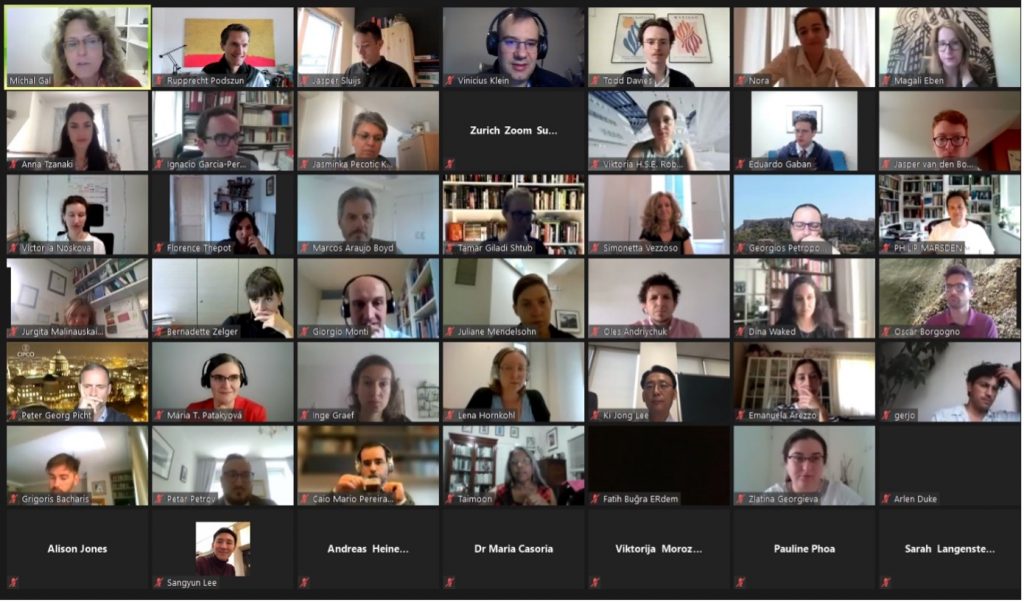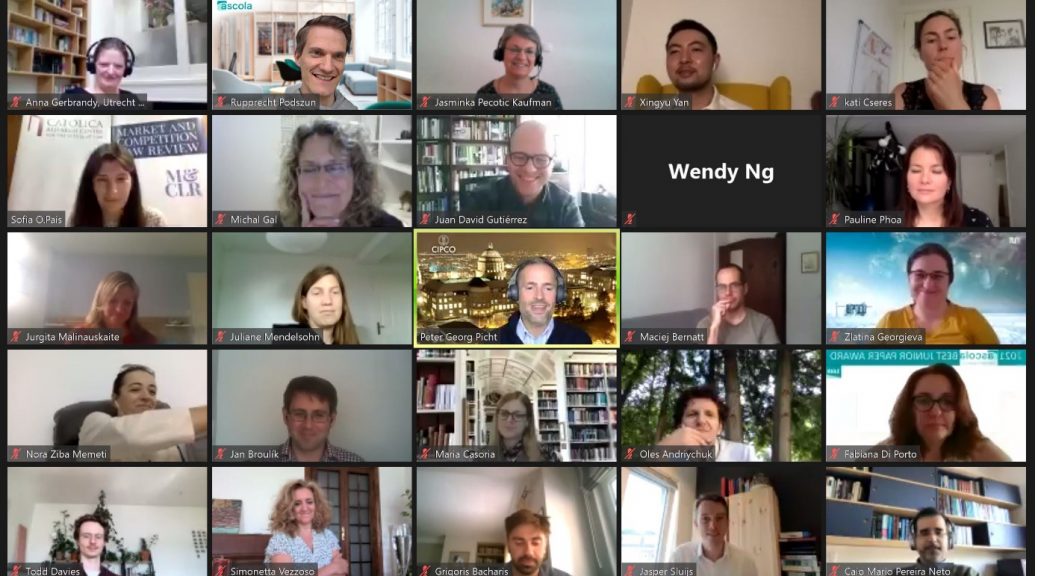
Conference Debriefing (25): ASCOLA2021
For three days in a row, Rupprecht Podszun sat through the Annual Conference of ASCOLA, the Academic Society for Competition Law – a scholars-only event where research on antitrust is on display. Yes, he does that voluntarily, but he also serves as the Vice President of this organisation, so read his debrief with care. He tells you about the big ideas, the big names and the small stories of this conference.
Name of the event: 16th Annual Conference of the Academic Society for Competition Law (ASCOLA)
General Topic: Competition and Innovation in Digital Markets
Time and place: 1-3 July 2021, world-wide on Zoom
Hosts: Universities of Haifa (Michal Gal), Zurich (Peter Picht) and Düsseldorf (Rupprecht Podszun) with their teams, jumping in again for Sofia Oliveira Pais and her team at Universidade Católica in Porto who invested a lot of prep work in vain for a second time – Pais imperturbably offered to host the “real event” for a third time, now in 2022.
Audience: Members only, i.e. competition law scholars from around the world. Ascola has now 500 members. To accommodate Wendy Ng from Australia, Juliana Oliveira Domingues from Brazil, Shuya Hayashi from Japan, Harry First from the US and Anna Gerbrandy from Utrecht, ASCOLA held the main sessions at around lunch time in Europe and had annex sessions on the fringes of the (CEST) day. This did not avoid strong coffee moments: Vicente Bagnoli, located at Sao Paolo, and Omar Vasquez Duque from Stanford presented their papers at 4 am in the night in their respective time zones.
This time zone thing fascinates me! Did you know that there is a neighbouring time zone with 3,5 hours difference, namely at the border of PR China with Afghanistan? So, when you put your foot across the border, you make a time warp from, say, 10 am to…
I understood, thanks. If that is of interest to you why not engage with the International Competition Network? Global antitrust issues seem to feature on the agenda again! At least, I found it interesting that Marek Martyniszyn spoke about extraterritoriality in EU law, and Qianlan Wu – in a joint paper with the legendary “Chinese mother of competition law” Wang Xiaoye – about enforcement cooperation of EU, China and the US.
Wait. Marek and Qianlan are both working in the UK, I guess extraterritoriality plays a role there, nowadays…
Good point, but let us skip Brexit; Ascola is far too friendly for rubbing it into the wounds of internationally minded lawyers. I just found it reassuring that global antitrust is still on the agenda, as are antitrust policies for developing countries. That is always a treat with Ascola, you get an inside of how our dear “free market principle” operates elsewhere. People like Taimoon Stewart from the Cayman Islands, Nora Memeti, working from Kuwait, or Ningrum Sirait had their stories to tell.
Tell me, I love stories!
Let’s take Ningrum’s example. She is from Indonesia, this is the fourth-most populous country in the world with 271 million people, so no reason to belittle those markets. Ningrum told the story of technological disruption and what competition essentially means: Ojeks are an important means of transport in Indonesia, I guess you took one if you went there – a motorcycle taxi where you sit closely knit with that hell-rider in a way you only snuggle with your partner, he has your hot breath in his neck, but it is not your passion, but the fear of an unexperienced European tourist.
Yes, that is called Boda-Boda in Uganda!
You name it. And now, what happens: This very traditional means of transportation is disrupted by Gojek, a mobile app, that started as a kind of Uber for Ojeks, so to speak, and is now a super-platform with payment functions and so on. Everything is a bit safer, cleaner, more polished and more capitalist than that old-fashioned Ojek system.
Now we are talking platforms!
Indeed, and this platform enters the competition with those Ojek riders who are now about to lose their jobs. Most of them do not qualify for being employed (or whatever that is) by Gojek, and it is no longer the hot breath of a fearsome European tourist that these riders have in their neck, but the chilling cold of competition. Professor Sirait did not say it explicitly, but she somehow seemed not to like this form of “competition overdose”, to quote the book by Ascola notables Ariel Ezrachi and Maurice Stucke. She painted the picture of disruption and what it means for traditional sources of income in Indonesia – this is, well a “problem of social cost”, if I may say so.
Why did you choose this story to tell me?
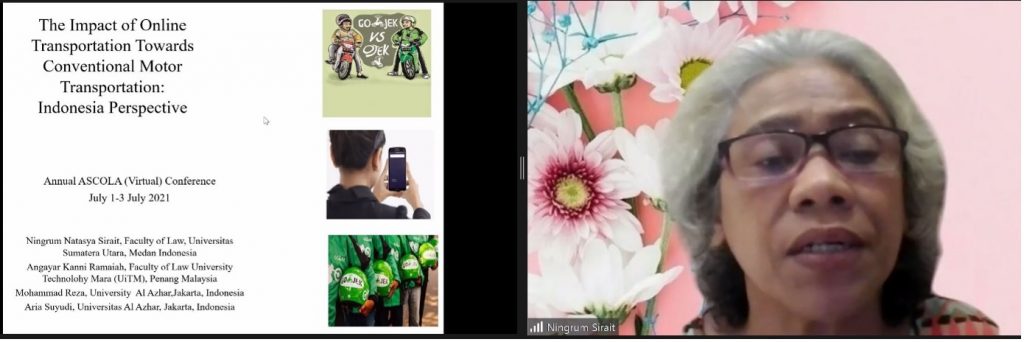
Because it is such a colourful example of what is going on. If you ever had that experience of speeding through Jakarta’s traffic on an Ojek you will never forget that. And here you see how digital shakes up the economy, be it in Indonesia or in Germany where retail platforms do the same thing with your local retailer. Probably, platforms are more efficient. But suddenly you start to wonder, at least if you have a heart, whether this is the kind of competition that you were fighting for with your research.
I do not really remember you fighting for market entry possibilities for platforms…
That is because you have lost your memory when playing with your smartphone day-in, day -out. But on a more fundamental level this was probably the recurring theme in most of the talks we had at #ASCOLA2021: How do we deal with the big platforms, the digital gatekeepers? And in how far do they challenge our basic assumptions in competition law? And, one of the more tricky questions is also how good we are at telling the difference between a heart-breaking story, economic facts, and legal rules.
Did you say “competition law”? Or was that “regulatory law”?
That borderline was one of the most-investigated this year. I think there are three groups of people: Some staunchly defend competition law and think we can solve current problems with antitrust rules. This group is getting smaller. Then, there is the other group that fully embraces a regulatory approach towards the digital gatekeepers. And in the middle, there are sound minds who engage in combining tougher antitrust enforcement with some regulatory intervention. They often take parallels from the (sometimes rocky) relationship of telecommunications regulation and general competition law and try to define the borderlines. That is cumbersome, one has to say.
To be honest: Digital is change, and it is progress! You do not really want to keep those Ojek riders for ever? Indonesia needs to move on!
That was not the end of story: Gojek became dominant and is charged with exploitation and all kinds of not so nice practices, if I got that right. So: Yes, we need innovation. But this is not the kind of change I wish to see.
When the Indonesian government banned Gojek by regulatory intervention, people in Indonesia protested wildly since they had been trapped by Gojek fallen in love with the services. Which brings up the question that someone brought up in a chatbox during a Zoom talk, namely whether criticism of super platforms is an elitist phenomenon or not. Someone wrote: People care more about quality of hospitals and the price of beer than about breaking up Facebook. That made me think.
Was there even talk about more traditional sectors of the economy or classic competition problems?
I guess so, but I mainly opted for those sessions where digital issues were all around. We had more than 120 talks, most of them in parallel sessions, so you could not see all (but recordings will be made available). And to be frank, the shift in the economy due to digital is what is on researchers’ minds these days. But to do justice: Jasper Sluijs challenged the Compass judgement of the European Court of Justice with a view to state-related distortions of competition. Francisco Marcos pointed at the shortcomings of the European damages directive that – in his view – leaves a couple of questions open. And some researchers like Marios Iacovides discussed that other big challenge: Sustainability. So, if I think about it, there were quite some talks that were not about digital.
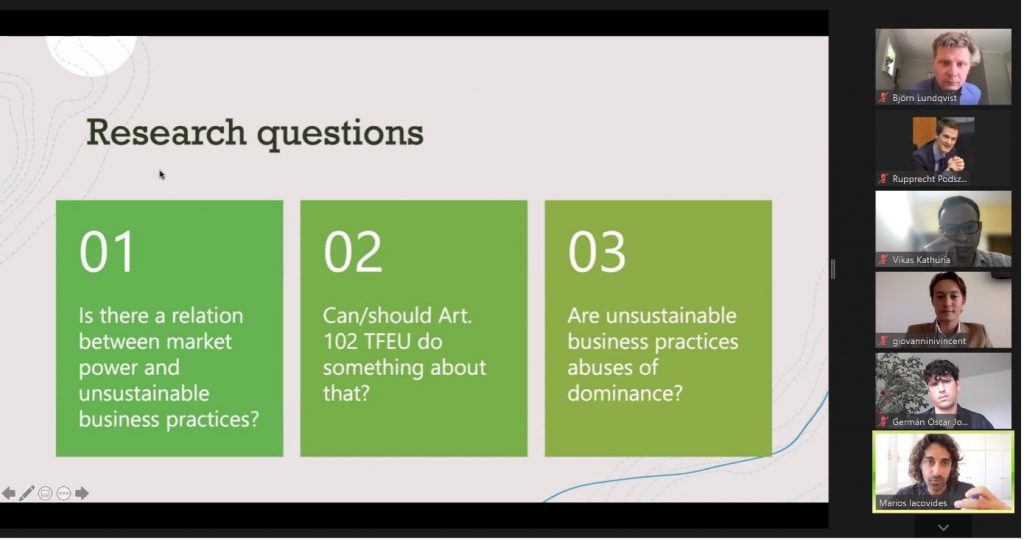
Some more content, please!
I have a soft spot for talks on market definition, having written on it a couple of times, and Magali Eben gave a good talk that just clarified why we so often fail to grapple with the concept of markets. Another favourite of mine was the presentation by Ki Jong Lee from Korea. The first thing that struck me was that he simply used his 12 minutes of time without saying that he was running out of time…
12 minutes!?
The idea is to showcase your work, not to have an intense two-hours-seminar for one paper. 12 minutes should be fine if you have a brilliant idea and wish to convince people to read your paper. Alternatively, you can of course speed up your talk the way Simonetta Vezzoso did when discussing Google Android. I double-checked my settings, but I had not put on the Fast-Forward mode. It was her speed of speaking!
So what did Ki Jong Lee suggest in his 12 minutes of Ascola fame?
Yes, I wanted to talk about his content! He suggests to force competition agencies to always define a “secondary market” that is not directly affected but is the nearest market that could be affected by a merger or an anti-competitive practice. And if there are certain findings on that secondary market, the burden of proof may shift. 12 minutes worth listening: A simple idea, great potential, something that sticks with you.
Ningrum from Indonesia, Ki from Korea – seems you fell for the Asians this time!
And I am not the only one! The Best Junior Paper Award went to Asia as well – to Xinyu Yan, a postdoc from Guanghua Law School at Zhejiang University. If you have never heard of that place before, you are probably not aware of China’s Ivy League Universities, the C9. The paper that won Xinyu the award from an international jury including Fabiana di Porto, Danny Sokol and Thomas Cheng, looks into mobile payment platforms and advocates mandatory standardization.
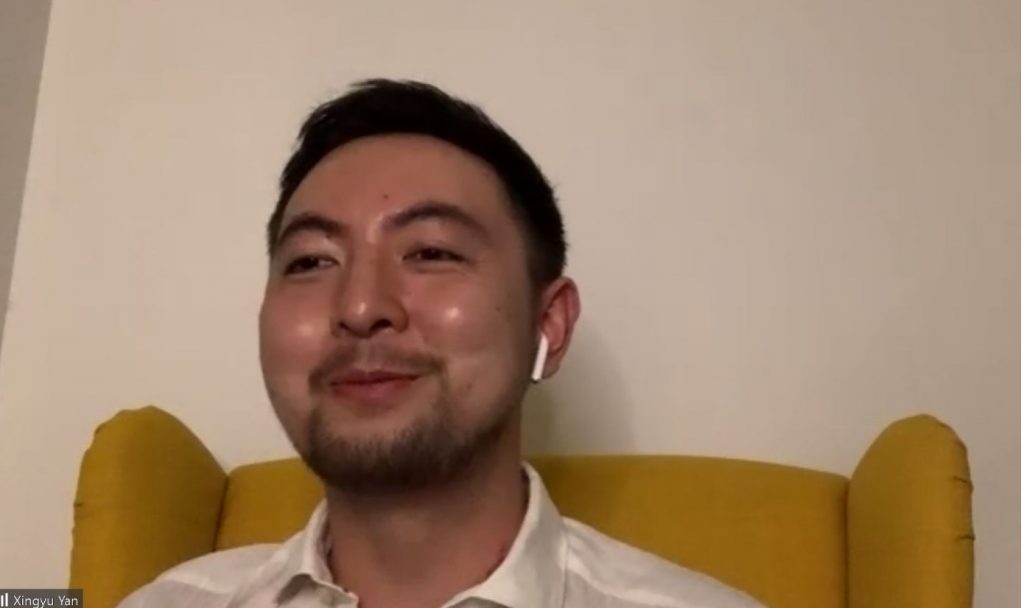
Having said that, the young class of antitrust which has grown enormously really writes good papers. I loved the one by Omar Vasquez Duque who looked into the effectiveness of the choice screen remedy in the Microsoft case (spoiler: not effective). Friso Bostoen and Marcin Kaminski both analysed self-preferencing and their presentations were different, but both very deep and intelligent. I am also a fan of the Munich Max Planck gang, including Germán Johannsen, Vikas Kathuria or Klaus Wiedemann, but I am very unfair now in not mentioning so many brilliant others whom I did not have the pleasure to read beforehand or to see on a panel.
Wait, I’ll put those names into my mobile phone… Meanwhile, any familiar names on the panel?
Ohhh, yes! If you look at the session chairs alone, I mean… show me that antitrust conference where Dan Rubinfeld, Eleanor Fox, Josef Drexl, Heike Schweitzer, Michal Gal or Ioannis Lianos act as time-keepers and fire the first question at you. Some of the more established professors (nowadays called “gatekeepers”) also presented. Giorgio Monti analysed the role of balancing in competition law. Michal Gal, the fabulous president of ASCOLA, spoke about “restorative remedies” and suggested that gatekeepers must share the learning that they take from data that they obtained unlawfully, that competitors could be subsidized to enter markets or that core platform services could be temporarily shut down to give the competition a breathing. Bill Kovacic, the former chairman of the US Federal Trade Commission…
…oh, a predecessor of Lina Khan then!
Well, if you wish to frame it that way, yes. He gave one of his volcano-eruption-like performances, partly in critique of the Chicago School. Todd Davies had a good question for him, but I cannot read from my notes which one, so you need to watch for that one on video. Kovacic called for better standards and higher salaries for enforcers: “A great nation will spend what it takes to go to the moon”, and that moon-landing of our times is the fight against Big Tech.
So, that is consensus?
Yes with very few dissenters. Several speakers advocated tougher merger control for the GAFAs. Carl Shapiro was the keynote speaker this year. You know that he is a star in innovation economics and – while being radical in his thinking, he is a moderate in his politics. But even Carl Shapiro seems convinced nowadays that something needs to be done (“I didn’t feel like this 10 years ago”). I am a bit unsure whether he knows that from the Economist that he quoted very often, or whether the Economist knows that from him, since the Economist quotes him very often (and recently, by the way, also quoted my podcast partner Justus Haucap, what a good journal!) However, in my ears it sounded as if Shapiro addressed the United States: The burden of proof for plaintiffs, so he said, is too high; some rule-making is necessary. And all eyes, his included, are now on Germany, UK and EU.
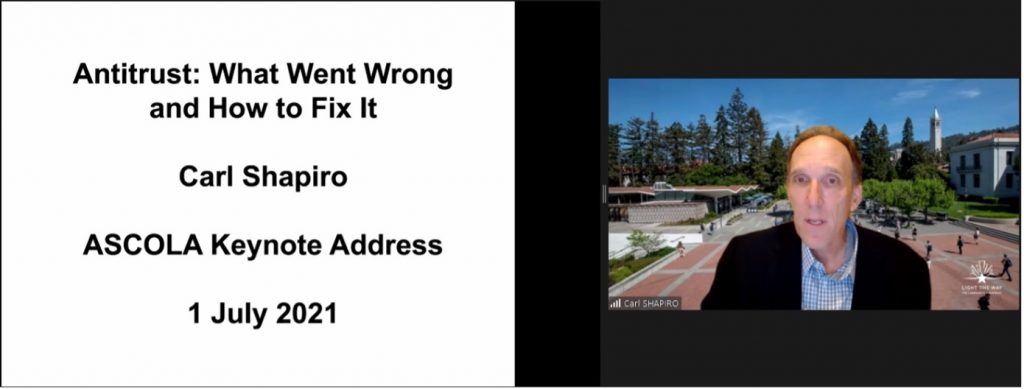
“Und es soll am deutschen Wesen / einmal noch die Welt genesen“?
I will not translate that… But: The conference aptly started with Wolfgang Kerber and Karsten Zolna presenting on the German Facebook case. That case really serves as an inspiration. We can only thank the Bundeskartellamt for giving such a good illustration of the current themes, eg the intersection of privacy and competition rules or the role of the consumer. Kati Cseres, Michael Borgers and Or Brook call for more consumer involvement in proceedings. And Inge Graef made the case for accepting that there is competitive harm when consumers are individually exploited: It goes beyond consumer protection laws since users are steered and no longer take active choices – you may call this a “personalised consumer welfare standard”. We are all vulnerable consumers these days.
What did the economic experts in their panel reveal to the lawyers?
Their different culture of clashing! While we are all so cosy and polite with each other, Tommaso Valletti, known to be the outspoken former Chief Economist of DG Competition, and Richard Gilbert, known to be a very famous innovation economist (he authored the US Antitrust/IP Guidelines), really clashed. It was entertaining! Valletti had recently called for a complete reversal of the burden of proof: Let the merging parties prove that their merger is efficient instead of the agency proving that the merger impedes competition. They were essentially debating the inverted U-relationship of competition and innovation: “I wonder why you still…” – “I disagree.” – “But you are wrong!” I somehow had to think of this video even though it does not really fit…

Anyway, it was Monika Schnitzer, as the female innovation economist on that panel, who used the discussion to put her research on the table: She had examined the break up of the Bell System in the U.S. and previous attempts of regulating the telco monopoly. Her crystal-clear analysis: Regulation was far less effective for innovation than breaking the thing up. And she smiled.
Do you try to make a point here that she is a woman and therefore has a different style on a panel?
Not at all, I am really not woke enough for such bold statements. But we reflected on our roles in a panel on Career Challenges. I will not quote from this one, but it was an impressive one with academics reflecting obstacles in their life, discrimination in our trade, confessions about work-life-balances that got out of hand and the exploitation of younger researchers. I wish for every professional community to have a forum like this.
So that was your highlight of the three days on Zoom?
Nope, I have another one, which really came as a surprise to me, but that is really exclusive.
We live in a sharing economy, Rupprecht!
Okay, but you don’t tell others, okay? I knew from last year that the very final session on Saturday night is an insiders’ tip. Everyone is relaxed, David Bosco hosts it, and it is just giving you a good fade out from that three-day conference circuit. So it was a very small but very devoted group of insatiable antitrust aficionados assembled before screens at this late point of time. We heard presentations, and when we were drawing to a close, with the ranks thinning out, we moved to the very final final final point in the programme, “presentation of new books on global antitrust”.
Okay, it is Corona times, so not so much to do on a Saturday night, but honestly…
Listen: The conference website had not revealed which books were presented, and I had not bothered to look it up in the PDF version. But suddenly, two legendary figures of U.S. antitrust law showed up! Barry E. Hawk and David J. Gerber. Barry had hosted the Fordham University Antitrust Conference for years, and David was introduced as the American professor with the most profound knowledge of European competition law. Here they were, sitting in front of their book shelves (“Thucydides”), and they gave that small but dedicated group an exclusive talk on how they see antitrust developments in the world.
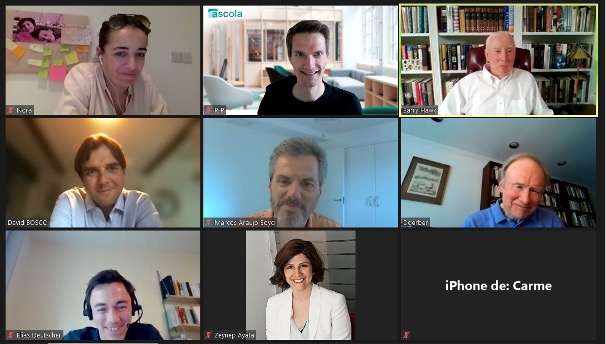
Ohhh, I see, that must have been special!
It was! Barry Hawk was quite confident, by the way, that courts in the United States start to follow the stance of Lina Khan sooner or later. “Don’t look at that recent Facebook ruling – what is it – a district court decision! Look at the NCAA case at the Supreme Court! That is the signal to watch – a 9:0 decision finding an antitrust violation! The general courts will not block the change, they do not care for different “schools of thought”.”
Wow. I guess I should read that Supreme Court case then…
Or their books – this one by Gerber and this one by Hawk. Gosh, I have so much to read after this conference! I better get started now.
Which paper will you start with?
Will not disclose. I have been so unfair in picking just a few names for this blog post, I already feel the guilt building up for not giving every presentation and paper its due attention. But you can look them up on this website – most of them are accessible if you click the speaker link!
Confession 1: “We may not have the best slides, but the silliest.” (Spencer Weber Waller)
Confession 2: “I think they have often have more depth than us.” (Economist Jose Aznar when asked what he finds odd when working with lawyers)
Rupprecht Podszun is the Director of the Institute for Competition Law at Heinrich Heine University Düsseldorf and the Ascola Vice President. He edits this blog (to which you can subscribe by registering for the Newsletter). At the conference, he spoke about “A principled approach to platform regulation”. More information on the Academic Society for Competition Law is available at www.ascola.org.
